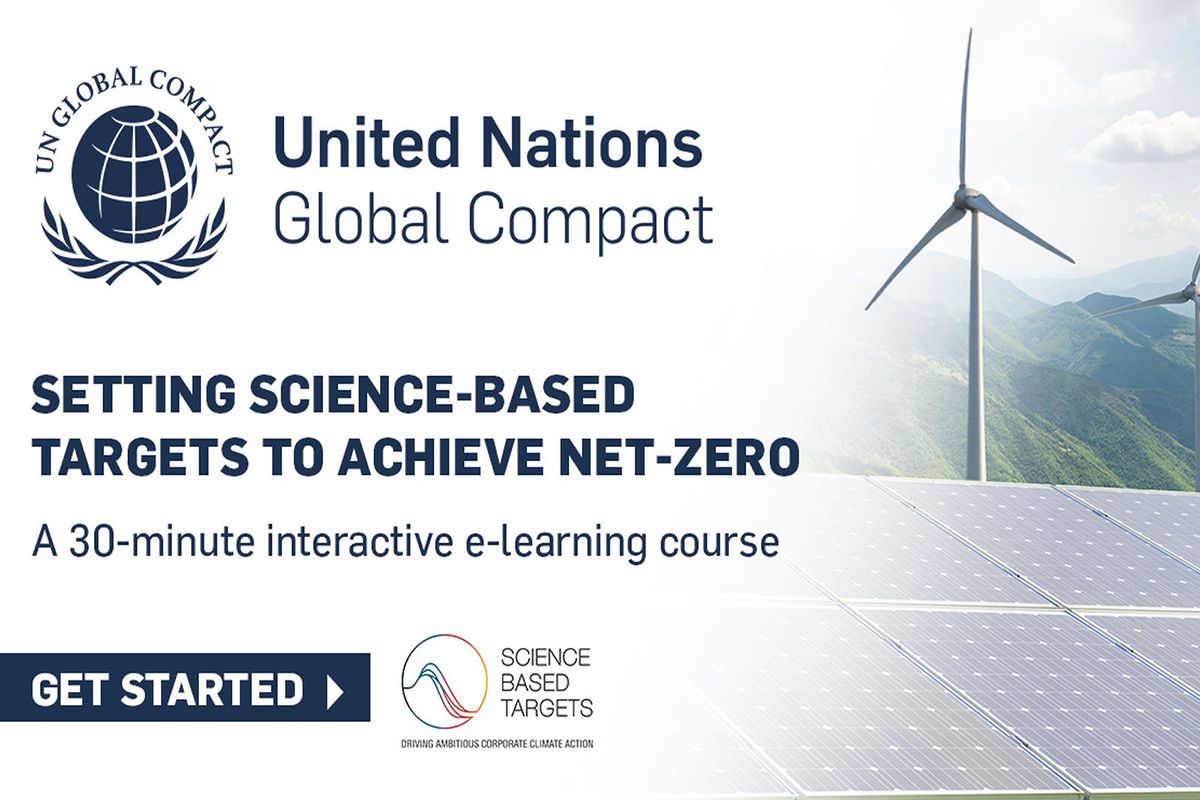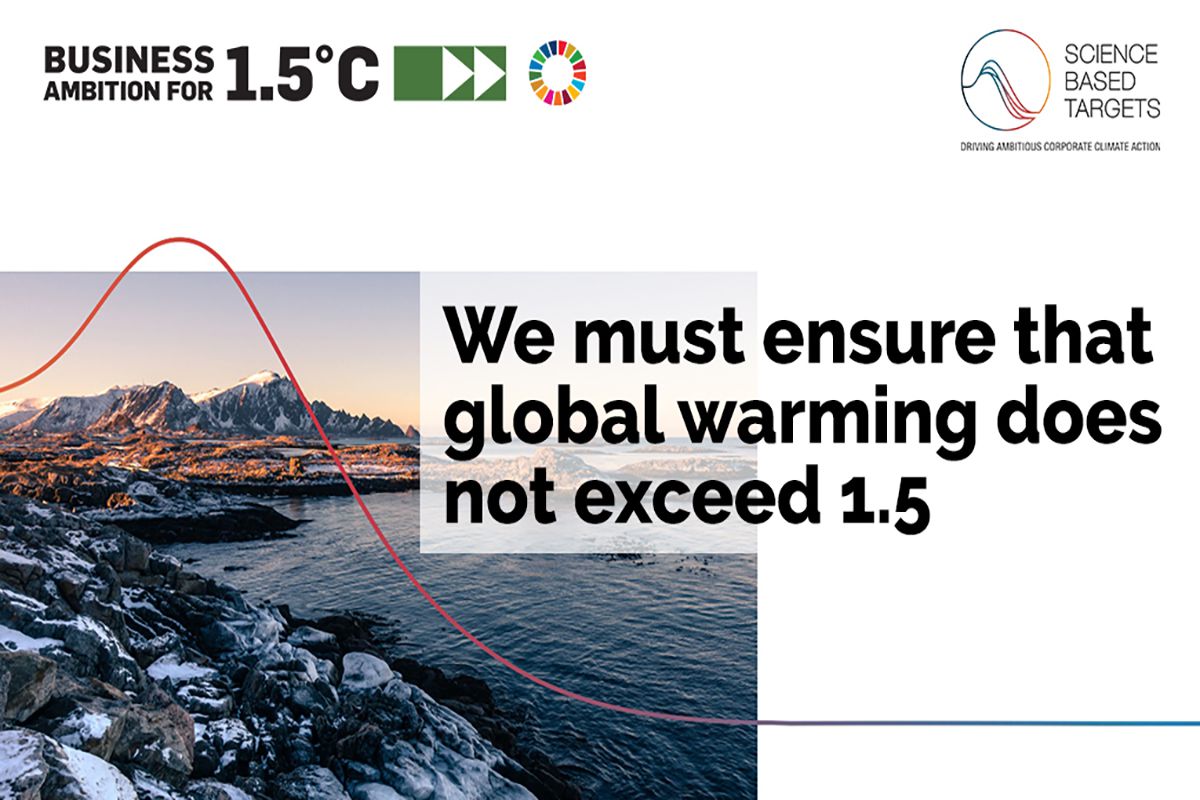The Science Based Targets initiative (SBTi)
Other ReportsLEAD THE WAY TO A LOW-CARBON FUTURE
Science-based targets provide companies with a clearly-defined path to reduce emissions in line with the Paris Agreement goals. More than a thousand businesses around the world are already working with the Science Based Targets initiative (SBTi).
The business benefits of science-based climate action are clear. Leading companies are already proving that a 1.5°C-compliant business model is possible, and there is evidence that these companies will be best-placed to thrive as the global economy undergoes a just transition to a net-zero future by 2050.
Business Ambition for 1.5 C - Over 500 companies committed & new SBTI materials to help you set targets
We are excited to announce that on Earth Day (22 April), the Business Ambition for 1.5 C campaign will reach the milestone of over 500 committed companies! The Science-Based Targets initiative and UN Global Compact will announce this on social media and please also keep an eye out for a press release from our partners at the Race to Zero. Help us spread the word by using our social media cards available here!
To support companies on their target setting journey, the SBTI has just released a series of additional resources we would like to encourage to have a look at:
- The SBTi How-To Guide for Setting Science Based Targets is a quick, simple, step-by-step flowchart that allows companies to understand how to set science-based targets for their specific situation.
- Three How-To Videos for using the three target setting tools currently available on the SBTi youtube channel: a general SBTi tool video, a transport tool video, and a passenger light-duty vehicle tool video.
- The SBTi Pre-Submission Checklist can be consulted to understand if a company is ready to submit targets for validation to the SBTi.
- And finally, the SBTi Corporate Manual, which is a combination of two previously available resources, the Call to Action Guidelines and the SBTi Manual, now combined, streamlined, and newly-released to best support companies throughout all steps of the science-based target setting journey!
For the sake of the planet – and business performance – it is imperative for the high-emitting oil and gas sector to start decarbonizing. We're developing a new methodology for companies in this sector to set science-based targets.
.png?1631861602956)
- SBTi Forest, Land and Agriculture (FLAG) Project FAQs
- SETTING 1.5°C-ALIGNED SCIENCE-BASED TARGETS: QUICK START GUIDE FOR ELECTRIC UTILITIES
- Value Change in the Value Chain: BEST PRACTICES IN SCOPE 3 GREENHOUSE GAS MANAGEMENT
- Green House Gas Protocol: Why use the Scope 3 Evaluator?
- FAQS Interested in setting targets or have a specific question about how the process works? Browse our frequently asked questions.
- SBTI Ambition update webinar - America
On August 24th 2021, we hosted a webinar to explain the changes to the SBTi criteria and implications for SBTi companies.
- UN Global Compact Academy: How to Set Science-Based Targets Aligning with 1.5°C Pathways
In light of the latest climate science and in the lead up to the Summit, the UN Global Compact calls on all companies to set their science-based targets with a new level of ambition — one that aligns with 1.5°C pathways. Starting with setting the context of the Climate Summit, in this Academy session experts from the Science Based Targets initiative and corporate leaders present new updated guidance to help companies raise ambition in practice, and also on how scope 3 targets are affected by the new climate science. Speakers Include: Heidi Huusko, UN Global Compact; Alberto Carrillo Pineda, CDP; Cynthia Cummis,World Resources Institute; Mats Pellbäck Scharp, Ericsson
- Financing Ocean-based Climate Solutions
A high-level meeting on “Financing Ocean-based Climate Solutions,” co-hosted online by the UN Global Compact Sustainable Ocean Business Action Platform and IDB Invest on the margins of the World Bank Spring Meetings. Dialogues will focus on the role of governments, companies and financial institutions in securing the necessary financing for the ocean to contribute to a resilient, equitable and net-zero emissions future.
Speakers: Mr. Ignace Beguin, Lead, Ocean and Coastal Zones, UNFCCC High Level Climate Champions Ms. Helena Vieira, Director General of Maritime Policy to the Minister of the Sea, Portugal Ms. Kennedy Carrillo, CEO, Ministry of the Blue Economy, Belize Mr. Gregory Watson, Lead Specialist, Natural Capital Lab, Climate Change & Sustainable Development Sector, Inter-American Development Bank Mr. Rodolphe Saadé, Chairman and Chief Executive Officer, CMA CGM Mr. James Scriven, CEO, IDB Invest Ms. Gyrid Skalleberg Ingerø, CFO, Kongsberg Gruppen ASA Ms. Isabel Ucha, CEO, Euronext Lisbon Mr. Joop Hessels, Executive Director Sustainable Bond Finance, ABN AMRO Bank Mr. Scott Mather, CIO U.S. Core Strategies, PIMCO Mr. Tom Eveson, Director, Sustainable Finance Solutions for the Americas, Sustainalytics
- Get ready for COP26: Join the Race to Zero through the SBTi Business Ambition for 1.5°C Campaign
In the run-up to the Biden-Harris administration Leaders' Climate Summit on Earth Day and COP26 in November 2021, this webinar provides a detailed overview of the importance of setting ambitious science-based targets (SBTs). The session covers the SBTi Business Ambition for 1.5°C Campaign commitment model for net-zero targets and 1.5°C aligned SBTs, key SBTi criteria, and the opportunities companies gain from setting SBTs.
The chemicals sector plays a central but complex role in the transition to a low-carbon economy. While chemical products are expected to contribute to the well-below 2 degree climate stabilization outcome described in the Paris Agreement, emissions related to chemicals production will need to be reduced to maintain global emissions budgets. In recognition of the central importance of the chemicals sector, in February 2020 the Science Based Targets initiative (SBTi) launched the chemicals sector scoping project. This webinar presents the results of the SBTi chemicals sector scoping project and explores what research is needed to further develop methods for setting science-based targets (SBTs) in the chemicals sector. The webinar also provides an overview of chemical company SBTs, key sector issues, and a proposed sector boundary for company activities.
- Project Updates: Science-based Targets for Forest, Land and Agriculture & Greenhouse Gas Protocol
This webinar offers an update about the Science Based Targets initiative (SBTi) Forest, Land, and Agriculture sector development project and the Greenhouse Gas Protocol guidance for carbon removal, land, and bioenergy. These two efforts are jointly addressing an important gap in corporate climate accounting and are enabling companies to incorporate land-related emissions in their climate targets. A Q&A session is offered. This webinar is jointly hosted by the Greenhouse Gas Protocol, the SBTi, WWF, and WRI.
-
Asia Webinar Series : Technical Guidance for Setting and achieving Science-based Targets
- Science-Based Targets for Financial institutions: Target Validation Criteria Deep Dive Webinar
The finance sector is key to unlocking the system-wide change needed to reach net-zero emissions and limit global warming to 1.5°C above pre-industrial temperatures. In October, the Science Based Targets initiative (SBTi) released a new framework that, for the first time ever, allows financial institutions to set science-based targets that align lending and investment activities with the Paris Agreement. Watch this webinar to learn more about the SBTi’s new framework for financial institutions. Using illustrative examples and Q&A sessions, the webinar provides an in-depth explanation of the SBTi’s target validation criteria for financial institutions and of the SBTi's recommendations for financial institutions. The purpose of the webinar is to help financial institutions and other stakeholders better understand the SBTi’s requirements, available resources for target development, and how to prepare science-based target submissions. Speakers: – Nate Aden, Senior Associate, WRI – Chendan Yan, Research Associate, WRI
- NEW: E-learning Course on Science-Based Targets The new UN Global Compact Academy E-learning Course on Science-Based Targets will guide you in the process of setting a science-based target in support of a net-zero future.

>>> more
>>> Join ‘Business Ambition for 1.5°C’









